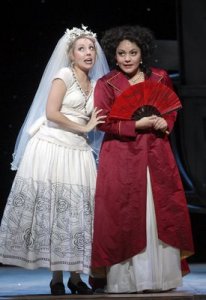Andrea Marcon at the Library of Congress; and the perils of lists
August 28, 2006
_____________________________________________________________
Andrea MarconThe Library of Congress has released its 2006-7 concert schedule, and I'm jumping up and down to see that the Venice Baroque Orchestra under Andrea Marcon is coming in February. (If you haven't heard their Vivaldi recordings, head to Amazon right away.) Plenty of other ear-watering stuff coming too, including the Beaux Arts Trio (Oct 7), the Orchestra of the Age of Enlightenment (December 7), and Daniel Bernard Roumain (February 15), to name just a few.
________________________________ And if you're at all interested in early music and haven't seen the exhibit "Noyses, sounds, and sweet aires": Music in Early Modern England at the Folger Theater, try to drop by soon.
And if you're at all interested in early music and haven't seen the exhibit "Noyses, sounds, and sweet aires": Music in Early Modern England at the Folger Theater, try to drop by soon.
It's a modest but genuinely interesting show -- and it's only there until September 9.
______________________________________________________________
The Post's chief critic Tim Page had a big spread in Sunday's paper listing the top works of the 20th Century ("20th-Century Music Gets a Bad Rap. Here Are 25 Reasons to Reconsider").
Take a look; it's aimed at people dipping their toes into these scary but fascinating waters for the first time, and includes thoughtful suggestions of works by Mahler, Janacek, Sibelius, Strauss, Busoni, Debussy, Schoenberg, Ravel, Orff, Bartok, Stravinsky, Berg, Copland, Revueltas, Shostakovich, Sondheim, Pettersson, Babbitt, Messiaen, Boulez, Stockhausen, Reich, Lucier, Britten, and Glass.
But of course it's a thankless task -- impossible to include the whole gang, and everyone with an interest in contemporary music will yell at you (Where's Ives? And Xenakis! What's Sondheim doing there? It's too avant-garde! It's not avant-garde enough!).
And I have to say, it was a venal crime not to include Sofia Gubaidulina.
Missing: SofiaBut it's great to see so many people responding with their own enthusiastic suggestions, including (as of this morning): Bernd Alois Zimmermann, Webern, Ligeti (twice), Rachmaninoff, Carter (of course!), Shapey, Elgar, Enescu, Falla, Honegger, Martinu, Prokofiev, Roussel (um ... Roussel?) and Szymanowski. And one reader took issue with the "dead white male " thing, pointing to a dozen female composers from Lili Boulanger to Meredith Monk who should have made the cut.
Next week: The top 100? Let the yelling begin!
This weekend: Corey Harris, the Smithsonian Chamber Players, and a roomful of weimaraners
August 24, 2006
_________________________________________________________________
The Smithsonian American Art Museum is doing more than its fair share to keep ears awake in DC this weekend. Supercool blues slide guitarist Corey Harris will be appearing at the museum's McEvoy Auditorium on Friday at 5 pm (it's free, and he's phenomenal, so prepare for a mob scene), and on Saturday at 3 music historian Michael Lasser will be giving a talk on 19th Century American song, with musicians there to provide examples (sorry to be so vague -- that's all the info they're giving out).
William WegmanWe'll definitely be there on Sunday, when the Smithsonian Chamber Players (James Stern, violinist; Kenneth Slowik, cellist; and Audrey Andrist, pianist) will be performing piano trios by Haydn, Beethoven and Mendelssohn, also in McEvoy Auditorium at 3 pm.
If you go, get there early and check out the big William Wegman retrospective ("William Wegman -- Funney/Strange") -- which will keep you smiling hours after you've left.
Weimaraners rule.
What I want for Christmas
August 23, 2006
_____________________________________________________________
The Guardian reports that the Austrian company Vienna Symphonic Library has developed "virtual orchestra" software that composers can use to simulate, more or less, what their scores will sound like when performed.
The program "mimics human musicians ... so convincingly that a casual listener to Classic FM would be unable to tell the difference," reports David Smith. "Perhaps more importantly, it allows notes - 1.5 million different sounds, to be precise - to be combined in new ways, so that composers can make new music on their laptop without needing to hire an orchestra."
The software can run well over $10,000, alas -- out of reach of most of my composer friends. Too cruel. Read the full story here.
The coming of the "virtual concert"?
August 22, 2006
_________________________________________________________________
Sara Kehaulani Goo had an intriguing report in the Post yesterday about the rise of "virtual concerts", where musicians and their audiences project their personal avatars into live, online concert halls. It's still extremely primitive -- we're talking about animated singers who can't actually move their lips -- but it's irresistable fodder for speculation on the future of concert-going.
"Marketing and record label executives say Web sites that put users into video-game-like virtual worlds are a unique way to reach out to audiences, who are increasingly spending their time and money on the computer instead of at concerts and music stores," writes Goo. "Although still experimental, such sites offer fans more ways to interact with one another and band members directly."
For a more probing and sophisticated discussion of these new virtual worlds, check out Mitch Kapor's speech at the Second Life Community Convention last Sunday. Kapor's one of the most interesting minds around; creator of the Lotus 1-2-3 spreadsheet application, founder of the Electronic Frontier Foundation, and chairman of the Mozilla Foundation, he thinks virtual worlds will be "extraordinarily empowering." We shall see.
More on all this at Second Life (the heavy hitter in this game) and There.com.
Tower Records -- an idea whose time has gone
August 21, 2006
______________________________________________________________ Over at ionarts, jfl has a post on the "sad news" that Tower Records is filing for bankruptcy. That's a shame -- I guess. A decade ago you could always pass an interesting hour or two browsing the classical section of their DC store, which (as jfl points out) was pretty impressive in its day.
Over at ionarts, jfl has a post on the "sad news" that Tower Records is filing for bankruptcy. That's a shame -- I guess. A decade ago you could always pass an interesting hour or two browsing the classical section of their DC store, which (as jfl points out) was pretty impressive in its day.
But frankly, there's a whole lot more to celebrate than to mourn. Buying music online is so preferable in every way that it's hard to work up any real tears over TR's possible demise. I've bought hundreds of hours of music in the past year, but only set foot in Tower once -- and that was just to escape a downpour a few months ago.
And honestly? It just felt ... totally obsolete. Stand around listening to snippets through greasy headphones that never work? How pleasant! Confine yourself to whatever the store happens to have on the shelves, instead of the limitless depths of Amazon? Very sensible. Rely on the advice of a salesperson, rather than accessing a thousand points of view online? Riiiiiiight. Buy a whole CD when you only want one piece? Hey -- thanks!
The brave new world of online music is here, and I think most of us have never been happier. What's more satisfying than coming across a reference online to a particular piece, getting curious about it -- and then being able to instantly download it for a few pennies? (I use emusic a lot -- you can download their vast inventory for about 20 cents a track, with no DRM.) I'm feeling deliriously rich, with this near-infinite supply of recordings at my fingertips for a fraction of what I used to spend. Not to mention the expanding universe of reviews, recommendations and suggestions from the musical cyber-community.
OK sure -- MP3's have their quality issues. But recordings are mostly for study anyway. And I'm absolutely ecstatic that it's finally possible for virtually anyone, anywhere, to dive into the world of classical music and explore it at a non-prohibitive cost. It's the single best thing that could have happened, and I'm betting it will invigorate the music community in ways we can barely forsee.
So, farewell, Tower Records -- R.I.P.
A summer night's Figaro
August 21, 2006
_______________________________________________________________
McKay (l) and Pérez photo by Stan Barouh The Wolf Trap Opera Company put on a lively Figaro this weekend; we caught the Saturday night performance (review today in the Post), and had a great time despite a drowsifying blanket of heat that descended on the Filene Center and refused to budge.
Not that this was a perfect performance -- the set was truly scruffy, the costumes ranged from so-so to ho-hum (with the exception of Marcellina, who shimmered like a gigantic hummingbird), there were annoying miking problems, a fourth act dance scene was comically inept, and the orchestra (under Ari Pelto's casual baton) was, to put it kindly, a little rough around the edges.
But who cares? This was a late-summer, open-air performance of Figaro, after all, and anyway it's the singing that counts. And the young vocalists -- especially Maureen McKay as an irresistable Susanna -- all turned in fine performances.
Here's the review:
The Washington Post 8/21/06: The Wolf Trap Opera Company closed out its 2006 season this weekend with Mozart's great comic opera "The Marriage of Figaro," and it was an inspired choice. Not only does this convoluted story of love and lust have a little something for everybody, but the music is some of the most captivating that Mozart ever wrote -- making it a perfect showcase for the up-and-coming young singers that Wolf Trap presents every summer.
The cast was spearheaded by baritone Ryan McKinny, who delivered an engaging Figaro, and Weston Hurt, who captured the twisting plight of the bumbling predator Count Almaviva with wit and imagination. Mezzo Faith Sherman (in the trouser role of the girl-crazy Cherubino), mezzo Ronnita Nicole Miller (Marcellina) and the rest of the supporting cast all turned in energetic and accomplished performances -- especially admirable given Saturday night's wilting humidity.
But the undisputed star of the show was the young soprano Maureen McKay, playing the willful and wily Susanna. Armed with a silvery, precisely aimed voice, natural stage presence and the kind of beautifully detailed acting you don't see often enough on the operatic stage, McKay turned in a smart, sexy and thoroughly charming performance. The delectably voiced Ailyn Perez, meanwhile, was equally riveting in the darker and more sensual role of the heartsick Countess; when the two sang together, it was honey in the ears.
It must be said, though, that the musical joys of the evening were undermined by a set that looked like it was banged together from old building scraps, given a fresh coat of dirt, and then -- when that looked too appealing -- was littered with department store closeout furniture. Palatial, it wasn't. But the music triumphed nonetheless.
ClassicalLounge.com goes online
August 18, 2006
___________________________________________________________
Check out the squeaky-new ClassicalLounge.com, a sort of upscale MySpace-y networking site for classical musicians. Joshua Gindele, the cellist for the Miró Quartet, just shepherded it online yesterday, and it looks good -- with groups, forums, classifieds, file-sharing and so on, it could grow into a useful and very cool resource for the classical community.
Connectivity: it rocks.
And by the way -- if you're in New York this weekend, the Miró will be joining Joshua Bell and friends in Mendelssohn's early-but-tasty Octet at the Mostly Mozart Festival (Sunday night at Lincoln Center).

